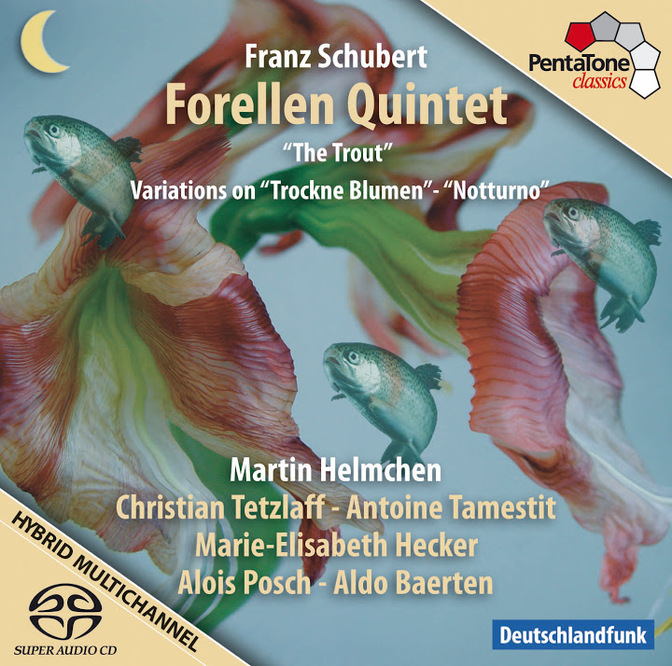CD1
Piano Quintet in A Op. posth. 114 - D. 667
"Trout Quintet"
Variations on Trockne Blumen for Flute and Piano Op. posth. 160 - D. 802
Piano Trio (Notturno) in E flat Op. posth. 148 - D. 897
Album information
The overly serious musicologist shrinks from pronouncing the words Trout Quintet. He is well aware that this “subtitle” did not originate with Franz Schubert, who wrote the quintet for piano, violin, viola, cello and double bass in A major, D. 667 (Op. posth. 114) in 1819. And indeed, the choice of epithets for works by other composers has at times been unfortunate; indeed, taking into consideration the content ot the entire work, one might even say misrepresentative, or distracting. For instance, take the occasionally odd popular titles given to Haydn’s symphonies – frequently based only on passing phenomena – which, of course, had never been the intention of the creator.
The popular title of the Quintet, D. 667, which was completely ignored in Schubert’s day, refers to the lied Die Forelle, which the composer had written sometime between the winter of 1816 and the following summer. He provides variations of this song in the fourth movements, which often sound humorous and cheerful. However, the story behind the creation of the poem is neither buoyant nor cheering. On the contrary: it is serious and extremely unpleasant, at any rate, for the writer of the text, Christian Daniel Fredrich Schubart (1739 – 1791).
Schubart wrote the poem while imprisoned in the mountain fortress Hohenasperg near Stuttgart. In the mountain fortress, Schubart wrote the poem of the trout, thus symbolizing the loss of his own freedom in the fable of the little creature, at first still so merry, which is deceived, imprisoned and deprived of its natural habitat. So the origin of Schubart’s poem had nothing to do with cheerfulness or a leisurely fable for children. And yet the song itself and, in particular, the quintet as a whole is a zippy piece of music in the truest sense of the word, and the title Trout Quintet (without quotation marks) sits well on it, in spite of any musicological scruples.





